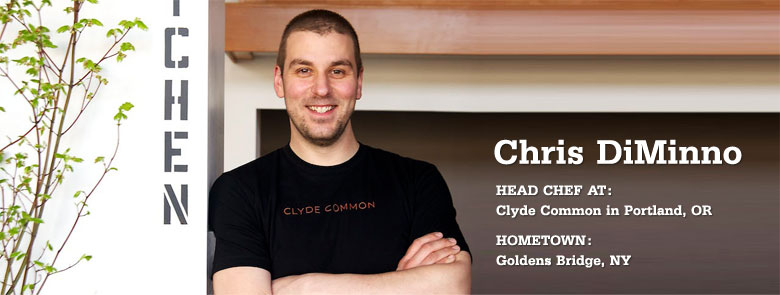
Chris DiMinno is the head chef at Clyde Common, a European-style tavern in Portland, where the menu changes daily and reflects the eclectic culinary artisanship of the Pacific Northwest. His Mediterranean-inspired dishes and deliberately simple cooking techniques have caught the attention of the food industry — he's done several events for the James Beard house since 2010.
DiMinno started cooking at 15, when he began an internship at New York City's La Madeleine. Since then he has worked in the kitchens at Telepan Restaurant, with locavore chef Bill Telepan, and at Blue Hill at Stone Barns, under the tutelage of chef Dan Barber. There, he gained respect for farmers and learned how to prepare homegrown ingredients in understated ways that elevate their natural flavors.
When he's not making fresh pasta at Clyde Common, DiMinno enjoys riding and fixing bicycles.


Q: What's your food philosophy? How would you describe your cooking style?
A: My style is based on simplicity. Everyone says that, but it's true, especially here in Portland. The produce and protein is so good, and the people producing it really care about it and want us to show it off, so that's all I want to do. I can't take credit for what I do; it's all about the best produce and best meat, trying to do as little as possible to it.
Q: What sets the Portland food scene apart? Why do you think there is so much enthusiasm around food in the Pacific Northwest right now?
A: Portland people will get behind a cause, and when everyone's excited, everyone will join in. It's funny, when I first came to town
before moving here, I was amazed at how honest the food was. I think that's why it's so good. In New York, there's something for everyone; in Chicago there's molecular gastronomy. In Portland, the food is the food your mom would have cooked you if she loved you. It's really simple and honest and straightforward, and people care about what they're doing and you can taste it. Every single food niche you could want is here: the vegans, the crazy carnivores, the pigs' feet eaters, the cheese-makers, the cattle farmers, everything. There are people who only grow baby radishes. What's unique is that it's all within a 30-mile radius; it's so small and so big at same time.
























